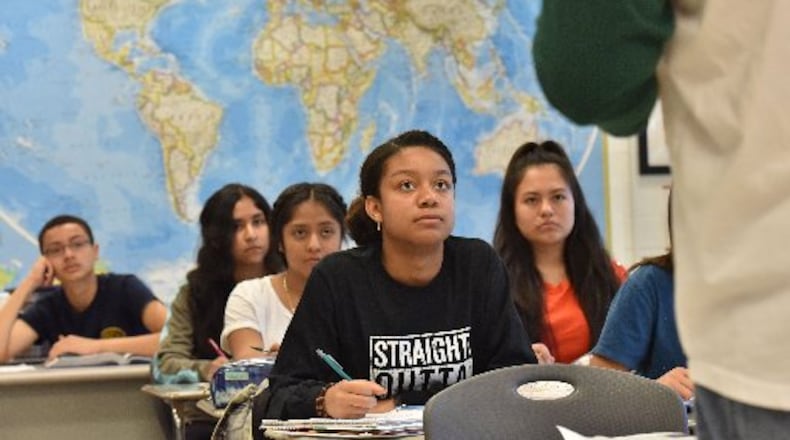Students and professors at colleges in Georgia and across the country are crying foul over, and saying university leadership has not responded well to, President Donald Trump’s order halting immigration from several Muslim-majority countries.
Many Georgia schools released statements similar to one from the University System of Georgia, which said it was monitoring restrictions and that campus international education offices would be the go-to source for information.
That’s not enough, Georgia State senior Asma Elhuni said.
“I would love a statement from the university … assuring students that the school provides safe spaces for all its students,” said Elhuni, 39, a naturalized citizen born in Libya. “They should be able to study confidently knowing they’re able to focus on their education.”
University System officials said 577 students in its schools are from the seven countries from which travel is banned for three months: Iraq, Iran, Libya, Somalia, Sudan, Syria and Yemen. Two Atlanta students, Yemen-born sisters whose family fled to Saudi Arabia, were stopped in the Riyadh airport over the weekend while trying to return from a trip to visit family.
Chinelo Tyler, a senior at Morehouse College, was among a group of students who put together an event in the Atlanta University Center protesting the detaining of Reham Noaman, one of those sisters. Noaman is a doctoral student at Clark Atlanta University. Her sister, Rakhaa, is a sophomore at Georgia State.
“I believe among a college campus built on giving the oppressed an opportunity at education, among a campus that is diverse in religion, nationality, and creed, it is essential that changes be made to reverse the actions of President Donald Trump and allow for students like Reham Noaman to return to the United States so that they may complete their education,” Tyler said.
Professors were mostly hesitant to speak on the record about their schools’ response to Trump’s order. Many said they’d like the schools to show more support for the affected students, professors and those worrying that they could face travel restrictions next.
According to College Factual, an online portal that aids with the college-selection process, close to 24,000 students from the seven targeted countries were studying in the United States in 2015. The group estimated the economic benefit of having those international students in the country at about $702 million, assuming those students are paying full undergraduate tuition, room and board and the price of books, among other things.
Emory University President Claire Sterk sent a note to the university community Sunday that called the immigration order “uncharted waters” and reinforced the university’s commitment to inclusion. “We must rely on our community strengths as we identify optimal paths forward, paths filled with care and resourcefulness for the people who are impacted, directly or indirectly,” she wrote.
Sterk also announced, in a letter Tuesday, that Emory will not become a “sanctuary campus” as some students and faculty had urged. Sterk said declaring itself a ‘sanctuary campus’ could lead some to incorrectly assume the university would disobey federal law. Emory, the letter stated, adheres to all applicable laws.
A Georgia House committee approved a bill Wednesday to ban colleges from receiving state funds if they did not comply with state and federal law. A full House vote on House Bill 37, introduced by State Rep. Earl Ehrhart, could come this month.
Nothing should deter universities from advocating for their students, said Tyler, the Morehouse senior.
“My observation is that many campuses and organizations are either not acknowledging the severity of President Trump’s executive order or they are struggling to form a united effort … that genuinely supports and upholds integrity of immigrant students,” he said.
Among metro Atlanta school districts, DeKalb County has been the most vocal about Trump's order and its continuing support for international students.
Of its nearly 103,000 students, 644 were born in Iraq, Iran, Libya, Somalia, Sudan, Syria and Yemen, according to district records. Superintendent Steve Green said he conferred with his cabinet Monday on a plan to reassure students and show support to them and their families.
“Any kind of threat to that wholeness of family impacts wholeness of the child,” he said. “As public educators, we educate all children … regardless of where they come from.”
Among other metro Atlanta districts, Fulton County has 32 students from the seven affected countries. Cobb, Clayton and Gwinnett County Schools and Atlanta Public Schools did not provide international student information.
About the Author





